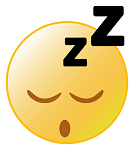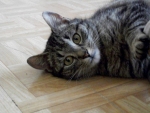You won't, either. You should go anyway.
It doesn't matter if your sleep study is at home or in a sleep center. It doesn't matter if you're going in for a diagnostic sleep study ("Do you have sleep apnea, and if so, how bad?") or a titration study ("What pressure should we set your CPAP machine for?"). During your sleep study, you'll have over a dozen wires glued to different parts of your head and body. You'll also have a band strapped around your chest. You'll have a pulse oximeter clamped and taped to one of your fingers. What's all that add up to? If you've ever worn an uncomfortable, poor-fitting piece of clothing ... this is far worse.
Does this sound uncomfortable to sleep in? Try going to the bathroom in it. At a sleep center, this will involve getting the technician's attention, getting unhooked, being given the wire harness (probably on a loop around your neck), and getting out of bed and walking to the bathroom with all of the above. If you're a guy and remain standing throughout the entire performance, you'll have to do everything one-handed; the other hand will be dedicated to keeping the wires out of the way.
At a sleep-center-based study, you may be hooked up to a CPAP machine for your very first time. This will not make you more comfortable. The CPAP mask is held in place with two straps that go around your head. Think of it as a small plastic version of the face-hugger monster from the movie Alien. (At least it won't incubate into a chest-ripper.) You may need to try on multiple masks, because the first mask may not work well. (I could barely breath with the nasal mask I was fitted with. "Keep breathing through your nose," the technician encouraged me. "If you need to, try breathing deeply." I did so, if "deeply" meant "with all your physical might and all your willpower." It was exhausting and terrifying. "I guess you're a mouth breather," the technician explained, fitting me with a mask that covered both my nose and my mouth. I was able to breath through my nose with that mask; I still don't understand why.)
Once you get a well-fitting mask, will you sleep well? No. The point of a titration study is see what pressure your CPAP machine will need. This means the sleep center technician will set the CPAP machine to a setting labeled "too low," and gradually increase it.
If you're lucky, your visit to a sleep center will be a "split night" study. After a few hours, the technician will come into your room, wake you up, announce that you've been successfully (?) diagnosed with sleep apnea, apply the face-hugger, and tell you to fall back asleep. If you're unlucky -- for example, if for some reason you haven't gotten enough sleep early enough in the sleep study night -- the technician will tell you there's isn't enough time remaining to do a titration study. Congratulations; you've just won a some-expenses-paid trip back to the sleep center. (That's how my first two sleep studies went.)
Finally, at a sleep center, you'll get woken up too early. At least for me, the studies were each done in one technician's shift. That's maybe nine hours to get there, wait for the technician to hook up someone who arrived before you, get hooked up, and go through everything described above. You can't do all that, and get seven or eight hours of sleep, in the time allotted. At the end of my most recent sleep study, one of the final questions was "If we'd let you, could you have slept longer?" I choked back my first thought (too rude) and simply said, "Yes, absolutely."
My first two sleep studies went from bad to worse. All I learned from the first study was, "You got no deep sleep; you need to come back." All I learned from my second study was, "You need a CPAP machine." (No, they didn't tell me if my deep sleep was any better with the CPAP.) I'd had two terrible nights and gotten really no data. I blew it off for four years.
My third sleep study, at home this time, was much more helpful. It wasn't being able to sleep in my own bed, or the lack of a face-hugger; it was the data! The home sleep study report included total apnea-hypopnea index (AHI), broken down by type of event. My total AHI was 46.8 events per hour, which scores as "severe." (It's probably understated. That number was computed against eight hours in bed, not the six hours of sleep my Zeo reported. Six hours is also consistent with my memory of waking up and not being able to fall back asleep for two hours. I'll talk about my soon-to-be-lamented Zeo some other time.) Here's how the data broke down by type of event:
- Obstructive sleep apneas: 3.5 per hour in bed; not bad.
- Mixed sleep apneas: 0.4 per hour in bed; no problem.
- Central sleep apneas: 17.7 per hour in bed, on the very low end of moderate; worrisome.
- Hypopneas: 25.2 per hour in bed (33.6 per hour of sleep, severe even if I had no apneas); uh-oh.
I just had my fourth sleep study (in a sleep center, with a CPAP machine). I knew I wouldn't get a good night's sleep. I didn't have to work the next day, so I also knew I'd have an opportunity to go home and fall back asleep, or at least take a nap during the day. I wrote a letter requesting data, gave a copy to my doctor to attach to my sleep study prescription, faxed a second copy to the sleep center's office, and brought a third copy with me to the sleep study and included it with all the paperwork I gave to the technician. It's too early to see how much it helped, but it couldn't have hurt. (My letter was based on the CPAP Talk article "Insurance, DMEs, getting the data-capable machine you need.")
I haven't gotten the report yet. (It'll take about two weeks.) I did get some informal feedback from the sleep center technician: "We were able to find a pressure that led to no respiratory events." (Or words to that effect; if that sounds fishy, I may be mis-quoting.)
I feel optimistic. I got an awful night's sleep during the sleep study. It'll be a few weeks before I can get a CPAP machine. I'll have to live with a face-hugger on my head and a pump by my bed. I won't get a magic "burst of energy" my first night as as hosehead (see the CPAP Talk article "Newbie would like to hear success stories, please"). But I've got a chance.














